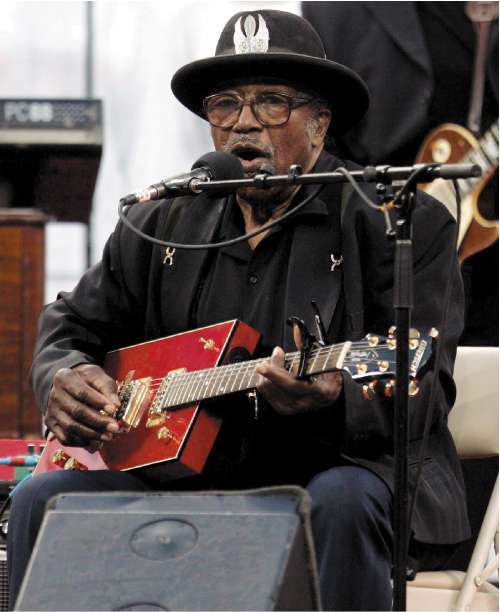Bo Diddley, guitarist who inspired the Beatles and the Stones, dies aged 79

Bo Diddley, the pioneering electric guitarist who was playing rock'n'roll when white America was still calling it jungle music and without whom there might never have been Elvis Presley, the Beatles or the Rolling Stones, has died at the age of 79.
Famous for his square, homemade guitar, which he plucked with oversize fingers to a relentless syncopated beat, crudely summed up as "bomp ba-bomp bomp bomp bomp", Diddley was one of the giants of popular music.
He died of heart failure at his home in Archer, Florida, yesterday, having worked relentlessly, partly out of necessity partly out of love, almost until the end of his life. He suffered a stroke while touring in Iowa last year followed three months later by a heart attack. His spokeswoman said his ability to speak had been severely affected and he was ordered to rest and rehabilitate at his 76-acre property where he kept his recording studio.
Diddley was a contemporary of both Little Richard and Chuck Berry, though his refusal to compromise with TV executives and court white audiences, meant he never enjoyed their level of fame.
In 1955, Diddley became the first black artist to appear on The Ed Sullivan Show but was banned from further appearances after he defied Sullivan's instructions to sing a cover song and instead performed his own hit "Bo Diddley".
Diddley was inducted into the Rock and Roll Hall of Fame, had a star on Hollywood's Walk of Fame and received a lifetime achievement award in 1999 at the Grammy Awards. In recent years he also played for the elder President Bush and President Clinton.
He released his first and eponymous single in 1955 with "I'm a Man" on the B side. Other major songs included, "Say Man, Who Do You Love?" and "The Mule".
Diddley, real name Otha Ellas Bates, was born into a family of sharecroppers in McComb in south-western Mississippi, later to become one of the most violent fronts in America's civil rights battles. He never knew his mother and was raised by a cousin. The family swapped the hardship of rural America in the Depression for the equally hostile surroundings of Chicago, where at least the factories offered work. There on the South Side he swapped the violin for the guitar and first heard the music of Muddy Waters and the man who was to become his idol, John Lee Hooker.
Diddley recorded more than 20 albums on the Chess label until 1974 but was forced to sell the rights to his songs having, he claimed, rarely been paid for live performances. It was a decision he regretted. "I am owed. I've never got paid," he used to tell interviewers. "A dude with a pencil is worse than a cat with a machine gun."
Enjoy unlimited access to 100 million ad-free songs and podcasts with Amazon Music
Sign up now for a 30-day free trial. Terms apply.
ADVERTISEMENT. If you sign up to this service we will earn commission. This revenue helps to fund journalism across The Independent.
Enjoy unlimited access to 100 million ad-free songs and podcasts with Amazon Music
Sign up now for a 30-day free trial. Terms apply.
ADVERTISEMENT. If you sign up to this service we will earn commission. This revenue helps to fund journalism across The Independent.
In recent years he had harsh words for the direction black music had taken, saying that "gangsta" rap made his blood boil. "I hate it. I call it rap-crap," Diddley said in 1996. "I can't seem to get my records played but they'll play all this garbage."
He also had mixed feelings over the way he was treated by other artists. "It seems to me that nobody can come up with their own thing, they have to put a little bit of Bo Diddley there," he said.
Last night, the former Led Zeppelin frontman, Robert Plant, said Diddley's death was "a great loss". He added: "This royal shapeshifter continues to influence four generations of musicians." Mick Jagger called him "a wonderful, original musician who was an enormous force in music".
The man who influenced many
Bo Diddley's influence was felt on both sides of the Atlantic. Buddy Holly borrowed the "Bo Diddley beat" for "Not Fade Away", while the Rolling Stones' remake of the same song gave them their first chart single in the US in 1964. The following year, the Yardbirds made the top 20 in the US with their version of "I'm a Man". John Lennon (pictured), Bruce Springsteen, Elvis Costello and The Who were also influenced by the guitarist. Diddley once said of other performers: "I don't like to copy anybody. Everybody tries to do what I do, update it. I don't have any idols I copy. They copied everything I did, upgraded it, messed it up. It seems nobody can come up with their own thing, they have to put a little bit of Bo Diddley there."
Join our commenting forum
Join thought-provoking conversations, follow other Independent readers and see their replies
Comments